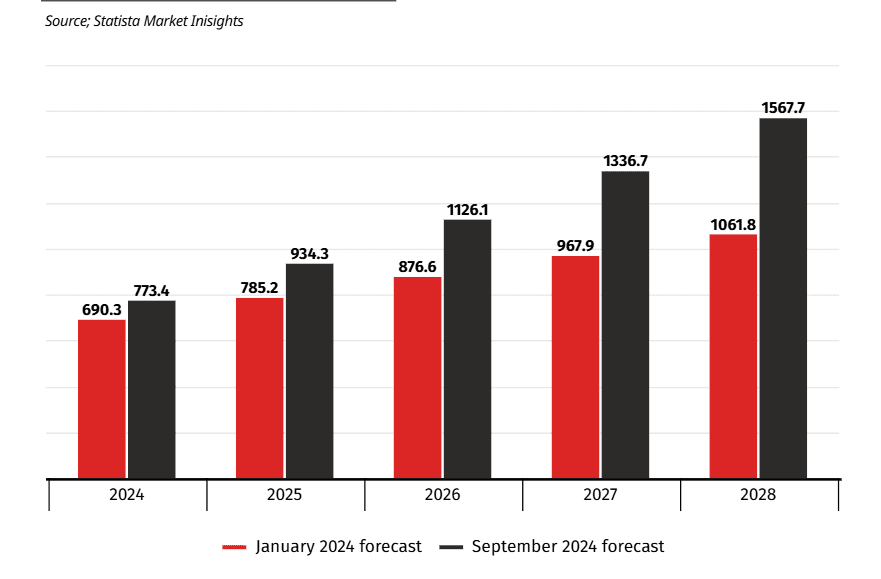business resources
Public Cloud Industry on Track to Become a Trillion-Dollar Market by 2026
24 Feb 2025, 11:28 am GMT
The public cloud industry, having nearly tripled since 2020, is forecast to reach $934 billion in 2025 and hit $1 trillion by 2026—two years earlier than anticipated. Corporate spending per employee rises from $95 to $217, with projections of $310 in 2025 and over $485 by 2029, fuelling market expansion.
The public cloud industry has grown at an incredible pace over the years, with billions of people worldwide relying on cloud storage to manage and protect their data. Since 2020, the industry has almost tripled in size and is set to reach an impressive $934 billion in 2025, a 20% increase from last year. However, the most remarkable aspect of this growth is the rapid expansion of the market, which is pushing the public cloud sector towards a historic milestone much sooner than expected.
According to data from Stocklytics.com, the public cloud industry is forecast to become a trillion-dollar market by 2026, achieving this milestone two years earlier than previously estimated.
Growth rate doubles compared to earlier predictions
The increasing demand for digital solutions, the rise of cloud-based storage and processing, and the affordability of public cloud services have propelled the industry to record-breaking growth. Since 2017, the public cloud sector has grown at an average annual rate of 25%, a figure that is exceptional even within the tech industry. The rapid development of cloud-native technologies such as AI, machine learning, and IoT has further accelerated this expansion, enabling the industry to reach key milestones faster than expected.
In January 2024, Statista predicted that the public cloud market would reach $785 billion in value in 2024, with an annual growth rate of around 14%. Based on this pace, the industry was expected to reach the one-trillion-dollar mark in 2028. However, by September 2024, Statista revised its forecast, revealing that the market is growing at an even faster rate.
The updated report states that the public cloud market will grow by 20.8% in 2024, reaching $934 billion, which is $150 billion more than the earlier estimate. With this accelerated growth, the industry is now expected to cross the trillion-dollar mark in 2026, two years earlier than originally predicted.
The growth momentum will continue in the coming years, with the industry’s total value expected to surpass $1.8 trillion by 2029. Annual growth rates have also increased significantly. While previous forecasts estimated rates between 9.7% and 13.7%, the latest data suggests a higher range of 17.2% to 20.8%.

Companies to spend more on cloud services per employee
As businesses continue to adopt AI, big data, and advanced SaaS tools, and as remote work becomes more common, corporate cloud spending has surged. Just five years ago, companies spent around $95 per employee on public cloud services. Since then, this figure has risen by nearly 130%, reaching $217 per employee in 2023.
Statista predicts that this trend will continue, with businesses expected to increase their cloud spending per employee by another 20% in 2025, reaching $310. As more companies prioritise cloud investments over traditional IT infrastructure, this figure is projected to soar beyond $485 by 2029.
Share this
Himani Verma
Content Contributor
Himani Verma is a seasoned content writer and SEO expert, with experience in digital media. She has held various senior writing positions at enterprises like CloudTDMS (Synthetic Data Factory), Barrownz Group, and ATZA. Himani has also been Editorial Writer at Hindustan Time, a leading Indian English language news platform. She excels in content creation, proofreading, and editing, ensuring that every piece is polished and impactful. Her expertise in crafting SEO-friendly content for multiple verticals of businesses, including technology, healthcare, finance, sports, innovation, and more.
previous
AI 4 Business: Top Artificial Intelligence Trends Reshaping Business
next
Why Your Business’s Future Hinges on Smart IP Protection